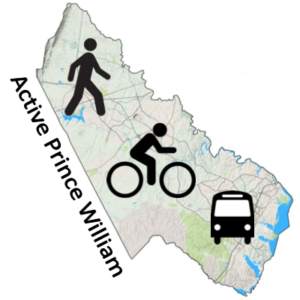 |
||
|
||
Prince William County to Host Route 28 Bypass Project Virtual Meeting Focused on the Fairfax County Connection and Tie-in on Monday, Dec.7Prince William County, in conjunction with the Fairfax County Department of Transportation, invites you to attend a virtual informational session regarding the Route 28 Bypass project on Dec. 7, 2020, at 7:00 p.m. This approximately $300 million infrastructure project, one of the largest in the history of Prince William County, will reduce traffic congestion, improve travel reliability and address other transportation challenges in the area. The meeting will inform residents of both counties about the project background, efforts to date, and the current status, focusing on proposed concepts for the Route 28 Bypass connection and tie-in point to the existing Route 28 in Fairfax County. The Prince William County Department of Transportation (PWCDOT) will host information sessions on the broader Route 28 Bypass project and address topics specific to Prince William County in the near future. The public is invited to ask questions at the conclusion of the presentation and to provide feedback. The project team will record the meeting and presentation and post them on the project webpage. Meeting Registration Information
Comments Due Monday, Dec. 7 at 5 p.m. To submit comments, questions or feedback, please contact PWCDOT:
Department of Transportation
### |
Category: Transportation (Page 9 of 14)
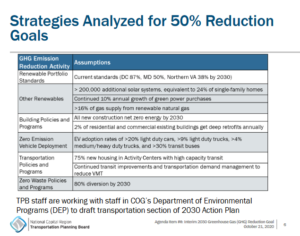
The above slide, from a presentation to the National Capital Region Transportation Planning Board (TPB) set for October 21, 2020, lists potential strategies to half the D.C. Region’s greenhouse gas (GHG) emissions from 2005 levels over the next ten years. The next step will be to draft and adopt a 2030 GHG Emissions Action Plan.
***
On October 16, 2020, Active Prince William Chair, Rick Holt, sent the following statement to Prince William County’s representatives on the National Capital Region Transportation Planning Board (TPB)–Prince William Board of County Supervisors Chairman Ann Wheeler and Neabsco District Supervisor Victor Angry. The TPB is scheduled to adopt an ambitious interim 10-year goal to address climate change, by reducing the D.C. region’s emissions of greenhouse gases 50% from their baseline, 2005 level by the year 2030.
***
On October 14, the Metropolitan Washington Council of Governments (COG) Board of Directors pledged to lower our region’s greenhouse gas emissions to 50% below their 2005 baseline level by 2030, as an interim target towards the 2050 goal of an 80% reduction. We appreciate the COG Board focusing on environmental and climate change issues that affect the quality of life of residents of the Metro D.C. area.
A key step in achieving that goal is to reduce Vehicle Miles Traveled (VMT). The regional housing targets adopted by the COG Board on September 11, 2019 provide a clear path to minimizing VMT–build 75% of new dwelling units in Activity Centers, within walking distance of high capacity transit nodes.
Prince William County has six designated Regional Activity Centers, based on existing and proposed Virginia Railway Express stations. The Board of County Supervisors may wish to add two more–at Dumfries/Triangle and Yorkshire–if their upcoming Small Area Plans include the creation of a Bus Rapid Transit system comparable to the Pulse in Richmond.
We look forward to you–our representatives on the Transportation Planning Board—actively engaging the other supervisors in how Prince William can meet the interim target in 2030 to reduce greenhouse gas emissions. In addition to increasing the energy efficiency of buildings and adding solar panels wherever cost-effective, we will need to integrate our land use and transportation planning with our climate change goals in the revised Strategic Plan and 2040 Comprehensive Plan. On a smaller scale, we ask that you ensure, in the public hearings for proposed Comprehensive Plan Amendments and rezonings, that staff reports identify the impact on Vehicle Miles Traveled, so climate change can be factored into your decisions.
We think you might also find the recent report on carbon emissions, Driving Down Emissions, published this week by Transportation for America to be of interest. To highlight a passage from the executive summary: Simply put, we’ll never achieve ambitious climate targets or create more livable and equitable communities if we don’t find ways to allow people to get around outside of a car. We look forward to working with you and the other members of the Prince William Board of County Supervisors in support of creating livable communities with sustainable transportation options.
###
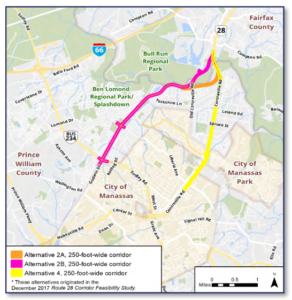
Active Prince William, Prince William Conservation Alliance, Southern Environmental Law Center, Sierra Club – Virginia Chapter, Coalition for Smarter Growth, Piedmont Environmental Council, Joint Land Use Committee of the Sully District Council of Citizens Associations and West Fairfax County Citizens Association
PRESS RELEASE
For immediate release:
October 8, 2020
Contact:
Rick Holt, Active Prince Williiam
Charlie Grymes, Prince William Conservation Alliance
Stewart Schwartz, Coalition for Smarter Growth
John (Jay) W. Johnston, for Joint Land Use Committee
Groups call on Northern Virginia Transportation Authority to defer action on Route 28 project
Calls Route 28 process extremely flawed
The Northern Virginia Transportation Authority (NVTA) is scheduled to approve a project agreement that will advance Alignment 2B for a Route 28 Bypass at their meeting on October 8. “Our coalition of conservation, smart growth, and transportation reform groups is calling on the NVTA to delay action because of the negative environmental, regional travel, and community impacts of the proposed Alignment 2B and because of significant procedural failings that must be addressed,” said Stewart Schwartz, Executive Director of the Coalition for Smarter Growth.
Rick Holt, Chair of Active Prince William noted that “State law, Section 15.2-2232, requires that new roads be consistent with local comprehensive plans, and that local planning commissions make a finding to that effect. However, Alignment 2B of Route 28, which the Prince William Board of Supervisors approved in a controversial 5 to 3 vote, is not in the Comprehensive Plan for either Fairfax County or Prince William County and has not been reviewed and approved by their planning commissions.”
“The entire Route 28 study process has been flawed and frustrated sound alternatives analysis and community input,” said Charlie Grymes, former chair of the Prince William Conservation Alliance.
- The 50+ families who would be displaced from a rare spot of affordable housing were not provided adequate notification and an opportunity to respond.
- The promised federal Environmental Study and Alternatives Analysis (originally proposed as an Environmental Impact Statement) was never completed and was prematurely abandoned, so the pros and cons of the alternatives were never adequately documented, much less presented for public review and comment.
- The critical Purpose and Need Statement for the Route 28 Environmental Study was never disclosed to the public prior to a October 9, 2019 public meeting. Not only was the Purpose and Need Statement never released for public comment, it was evidently never released for review and comment by relevant local, state, or federal agencies.
- No public hearings were ever held for this project prior to the July 14, 2020 public hearing before the Prince William Board of County Supervisors to proceed with the preliminary engineering for Alignment 2B.
- None of the written reports for the Route 28 Environmental Study, including the Traffic Technical Report, were posted for public review prior to July 7, 2020, only one week prior to the July 14, 2020 public hearing. These reports and their findings were never discussed at any prior public meetings for this project.
- Despite the Fairfax County location of “Option 2B,” the Fairfax County Board of Supervisors has held no public hearing on either amending the adopted Comprehensive Plan, or approving the proposed route for the new Route 28 bypass “Option 2B” through Fairfax County.
- The May 2019 Traffic Technical Report from the Environmental Study shows Alignment 2B would produce the most failing intersections of the four alternatives studied. Furthermore, compared to the No Build Alternative in 2040, building the Bypass would increase traffic volumes on Route 28 in Fairfax County on the north side of the Bypass by as much as 26%.
- Study findings showed that the “least environmentally damaging practicable alternative” that meets the purpose and need is Alignment 4 along the existing Route 28 north of Manassas, and the Prince William Board of County Supervisors voted 8 to 0 on August 4 to adopt this alternative
- In an unusual in-person presentation by the Chair and Executive Director of the Northern Virginia Transportation Authority on September 8, the Prince William supervisors were warned that NVTA would revoke the planned $89 million for the Route 28 project unless Alignment 2B was chosen, and funding might be allocated instead to projects in Loudoun County or other jurisdictions
- The Prince William Board then held a second vote, switching to Alternative 2B on a 5 to 3 vote, without allowing additional public t
- Informed advocates repeatedly offered an improved version of Alternative 4, along an extension of Well Street through Yorkshire, that would minimize impacts on Route 28 businesses, greatly lower project costs, and could create dedicated bus/HOV lanes and a network of street connections to support economic revitalization. This concept would also create the potential for Route 28 bus rapid transit, but county staff refused to consider this alternative, while pressing their preference for Alternative 2B
“Alignment 2B would displace over 50 families from their homes. It would add noise and pollution to “equity emphasis” neighborhoods and plow through the floodplain/wetlands of Flat Branch, which feeds into Bull Run and the Occoquan Reservoir, a critical drinking water supply,” said Grymes. “Alignment 2B would fuel more sprawling development and traffic coming from as far away as Fauquier and Culpeper, rather than address existing traffic coming from central Prince William via Liberia Avenue.”
“Just this one project, which is opposed by the local elected supervisor, would consume over 56% of the 2019 Prince William County road bond funding, limiting the ability to build other high-priority projects which are desired by local supervisors in other parts of the county,” said Holt.
“We developed and offered a carefully thought out alternative, but the Prince William staff have repeatedly declined to consider it,” said Mark Scheufler, a local resident and transportation engineer who developed the modified Alternative 4 dubbed “Well Street Extended”.
“We are deeply concerned about the rush by Fairfax County and the NVTAuthority to push through Alternative 2B, which is not on the county’s comprehensive plan, and to do so without public hearings in Fairfax or analysis of the severe harm it could cause to Bull Run and the Occoquan watershed,” said Joseph Johnston, speaking for the Joint Land Use Committee of the Sully District Council of Citizens Associations (“SDC”) and West Fairfax County Citizens Association (“WFCCA”) joint land use committee (the “Joint Committee”). “We are calling on the county to delay approval of Alternative 2B until after such time as any associated Comprehensive Plan amendments can be investigated and evaluated, including the transportation and environmental impacts of the “Option 2B” proposal with its new bridge, new bypass and new interchange located in the downzoned R-C district, upstream from the Occoquan Reservoir, and until after full opportunity for participation by Fairfax County citizens and advocacy groups in open public hearings, and a vote by the Fairfax County Board of Supervisors, on those amendments.
“We remain deeply frustrated and concerned that massive expenditures of tax dollars are being based on such flawed processes without full, fair, and transparent consideration of alternatives,” said Schwartz. “With our nation in a long-term funding crisis, we cannot afford the failure to consider more cost-effective alternatives, and to husband our resources for the most important priorities.”
###
By Charlie Grymes, Active Prince William Board Member
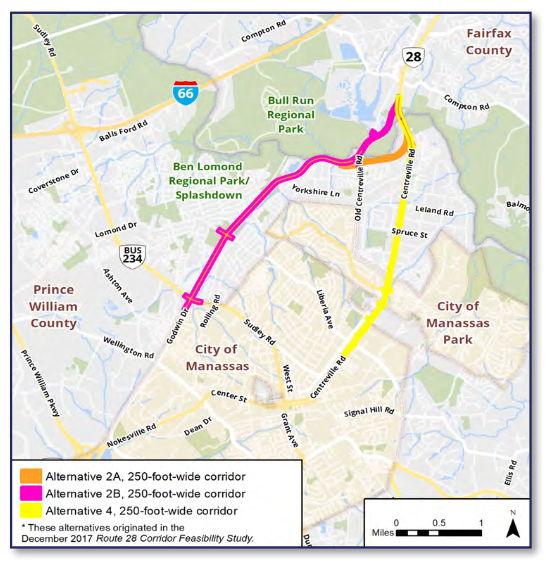
On September 8, the Prince William Board of County Supervisors (BOCS) reversed an 8-0 decision made just a month earlier and reinstated the Route 28 Bypass (Alignment 2B) in a 5-3 vote.
The BOCS voted before listening to any of the citizens who were waiting to address the Board during the scheduled 2:00 pm Public Comment Time, which was delayed for more than three hours, and they declined an opportunity to wait until the next Board meeting before finalizing their decision.
The decision split along partisan lines; all five Democrats switched.
One quote from the discussion is relevant – “we have not made a decision on construction.” A new road up Flat Branch is not yet guaranteed, though it came a lot closer to reality on September 8.
Over 50 homeowners are now at risk of having their homes “taken” for a commuter road. The equity lens associated with this issue bent under pressure and developed a cataract over the last 34 days.
$89 million was previously set aside by the Northern Virginia Transportation Authority (NVTA) for construction of Route 28 improvements, but the Board will need to sell $200 million in County bonds to fund Alignment 2B.
The County’s finance staff made clear in early 2019 that selling the $200 million in bonds will require raising local taxes. The issue remains alive…
###
By Rick Holt, Chairman, Active Prince William
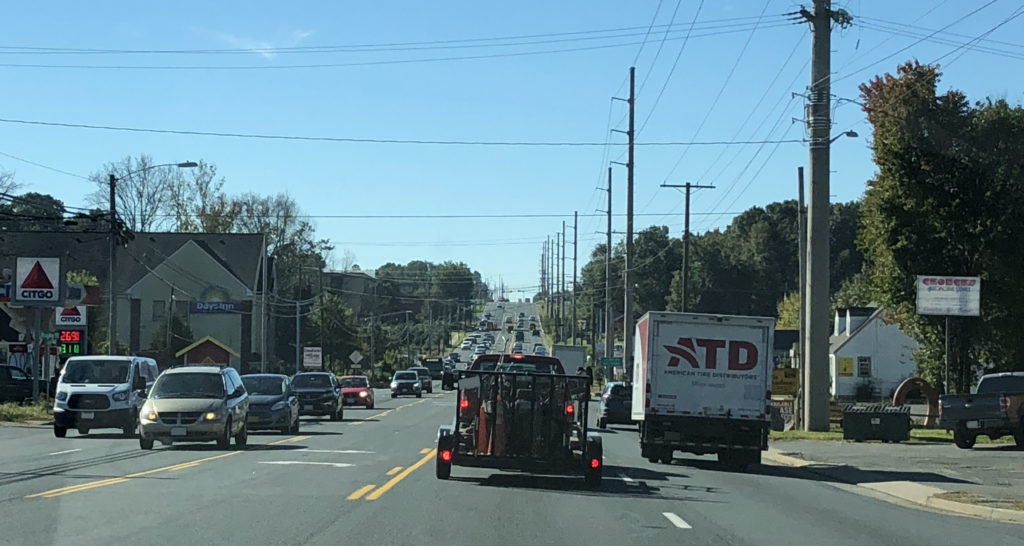
Active Prince William applauds the Prince William Board of County Supervisors (BOCS) for rejecting the Route 28 2B alignment on August 4 (see Agenda Item #10B, starting at 4:18 on the recorded video). We further agree that doing nothing to fix Route 28 through Yorkshire is not an option; however, widening Centreville Road itself by adding two general-purpose travel lanes would disrupt many businesses.
VDOT’s Centreville Road (Route 28) STARS (Strategic Targeted Affordable Roadway Solutions) Study, championed by Delegate Roem, recently recommended a $38 million package of intersection, raised median, and pedestrian improvements that–in the absence of general roadway widening–1) would significantly reduce intersection delays and expand vehicle capacity and pedestrian access along Route 28 and 2) was ripe to receive VDOT SMART SCALE funding for design and construction in spring 2021.
Unfortunately, proceeding with widening Route 28 itself through Yorkshire could make the sensible and cost-effective STARS Study recommendations infeasible. Therefore, we encourage the BOCS to explore an alternative approach, integrated with a new land-use plan (Small Area Plan) for economic development and revitalization along this corridor. Alternative 4 could be modified to include a new multimodal street just to the west, so highway investment could stimulate transit-oriented, mixed-use redevelopment of the properties between and fronting the existing and future sections of Centreville Road. Integrated planning could foster the creation of a vibrant new livable community with affordable housing at a key gateway to Prince William County.
